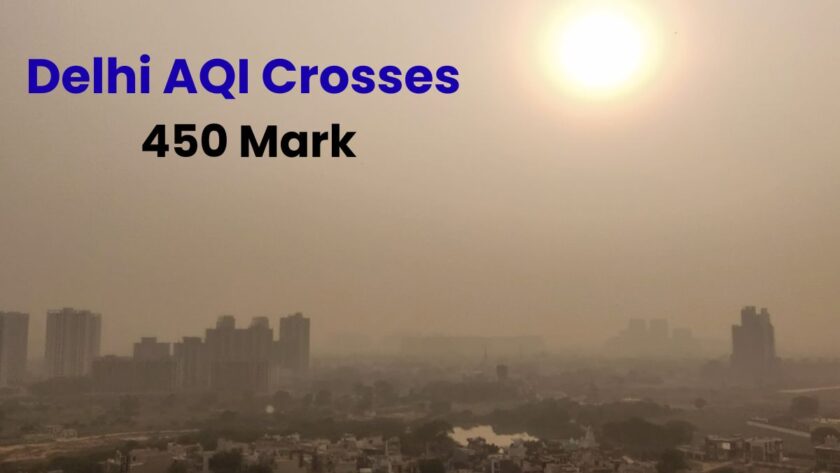Despite Supreme Court limits on firecracker timings, celebrations continued late, worsening Delhi’s air quality.
Delhi residents woke up on Tuesday morning struggling to breathe as the city was covered in thick, smoky haze following Diwali celebrations. Even though there were restrictions in place, people continued bursting firecrackers late at night, causing pollution levels to rise sharply.
According to private air quality monitor AQI.in, the city’s Air Quality Index (AQI) touched a shocking 475 at 6 AM, placing Delhi in the “hazardous” category. Almost every monitoring station in the city recorded toxic levels of air pollution.
Out of Delhi’s 38 air-quality stations, 36 showed readings in the red zone, indicating very poor to severe air quality. The average AQI stood at around 448 by 8:12 AM on October 21, 2025.
Some of the worst-hit areas included:
Bawana – 423
Wazirpur – 408
Jahangirpuri – 407
By early morning, Delhi’s overall AQI averaged around 451, marking one of the worst post-Diwali pollution levels in recent years.
Fireworks continue despite bans and time limits
The Supreme Court had allowed only green crackers between 8 PM and 10 PM on Diwali night, but fireworks continued well past midnight. Enforcement was weak, and thick smoke filled the air as celebrations stretched late into the night.
This widespread violation of rules pushed pollution levels across the national capital to extremes. Environmental experts said that the spike was not only due to crackers but also because of other factors like vehicular emissions, industrial smoke, construction dust, and biomass burning.
Also Read: Most Affordable Cars With ADAS Under ₹15 Lakh: Know Here!
On Diwali night, experts estimated that industries contributed about 23.3% and vehicles around 15.6% to Delhi’s overall pollution load.
Health Risks Rise Sharply
The AQI reaching “severe” (above 400) means serious health threats for everyone, especially for children, the elderly, and those with asthma or heart diseases.
Doctors have warned that breathing this air for even a few hours can cause coughing, throat irritation, headaches, chest tightness, and aggravated lung diseases.
To stay safe, experts have advised residents to stay indoors as much as possible, avoid outdoor activities, especially early morning and late evening, wear N95 or KN95 masks when stepping out, keep windows closed and use air purifiers indoors, stay hydrated, and avoid heavy exercise outdoors.
Hospitals have already started reporting an increase in patients with breathing difficulties and eye irritation following Diwali night.
Government Activates Emergency Measures
With air pollution touching critical levels, the Commission for Air Quality Management (CAQM) has activated Stage II of the Graded Response Action Plan (GRAP) across Delhi-NCR.
Under GRAP Stage II, the following emergency actions are being enforced:
- Ban on coal and firewood in hotels, restaurants, and open eateries
- Restrictions on diesel generators except for essential services
- Increased road cleaning and water sprinkling to control dust
- Strict monitoring of pollution hotspots like Anand Vihar, Wazirpur, and Jahangirpuri
The Delhi government has urged people to cooperate with pollution-control measures and to stop using leftover crackers.
Meteorologists explained that low wind speeds, falling night temperatures, and high humidity have trapped pollutants close to the ground, making it difficult for the toxic particles to disperse.
These stagnant conditions are common during late October in Delhi, but this year the pollution spike has been much sharper. Experts fear that the situation may worsen over the next 24 to 48 hours unless strong winds or rainfall help clear the air.
Pollution Levels Higher Than Last Year
This year’s post-Diwali air pollution is worse than last year’s. In 2024, Delhi’s AQI had peaked at around 398 the morning after Diwali. In 2025, it surged to 475, making it one of the most polluted Diwali mornings in recent memory.
The difference highlights how continued use of banned firecrackers, rising vehicle emissions, and weak enforcement have pushed the city’s air quality to dangerous limits.
Authorities Urge Residents to Stay Indoors
Health authorities have labeled Delhi’s air as “severe and hazardous,” urging residents to stay indoors and avoid unnecessary travel. Schools are likely to reduce outdoor activities, and some offices are encouraging work-from-home options to reduce exposure and traffic emissions.
Doctors and environmental experts are also asking citizens to monitor the AQI regularly and take precautions until conditions improve.
Experts predict that if wind speeds remain low, pollution may continue to stay in the severe range for the next couple of days. The government may soon implement Stage III restrictions of GRAP, which include a ban on construction activities and stricter vehicle controls, if pollution levels cross the danger threshold again.
Frequently Asked Questions (FAQs)
- What does an AQI of 475 mean?
An AQI of 475 falls in the “hazardous” category, which poses a serious health risk for everyone. Even healthy individuals can experience breathing difficulties and eye irritation, while those with existing conditions may face severe complications.
- What is the Graded Response Action Plan (GRAP)?
GRAP is an emergency plan implemented in Delhi-NCR to control air pollution. It includes different stages (I to IV), each activated based on pollution levels. Stage II currently includes restrictions on fuel use, generators, and construction dust.
- What are green crackers, and why are they allowed?
Green crackers are designed to release 30% fewer harmful emissions compared to traditional ones. The Supreme Court allows them in a limited time window, but their misuse or excessive use still worsens air quality.
- Which areas in Delhi are the most polluted today?
As of October 21, 2025, areas like Bawana (423), Wazirpur (408), and Jahangirpuri (407) recorded the highest AQI levels, putting them in the severe category.
- How can residents protect themselves from the current air pollution?
Stay indoors, wear N95 masks, use air purifiers, keep windows shut, and avoid morning walks or outdoor exercise. Drink plenty of water and seek medical help if you experience breathing problems or throat irritation.
